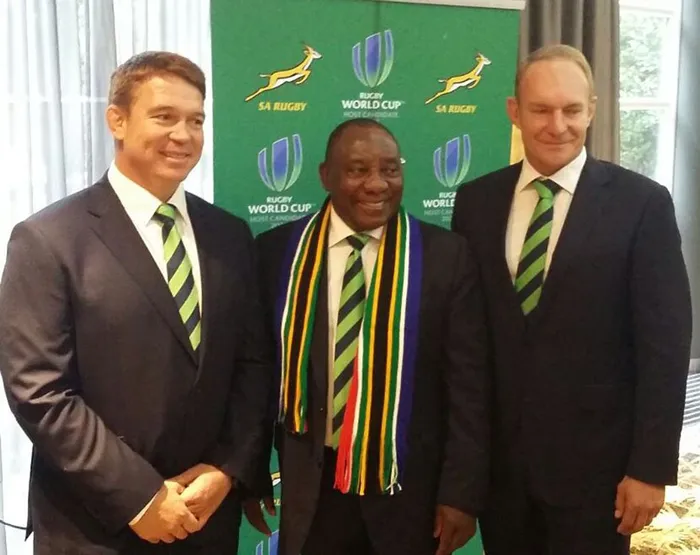SA gets world body's nod to host 2023 Rugby World Cup

Deputy President Cyril Ramaphosa is flanked by Springbok World Cup-winning captains John Smit and Francois Pienaar in London during their presentation to host the 2023 Rugby World Cup. Photo: @Springboks via Twitter Deputy President Cyril Ramaphosa is flanked by Springbok World Cup-winning captains John Smit and Francois Pienaar in London during their presentation to host the 2023 Rugby World Cup. Photo: @Springboks via Twitter
South Africa have taken a giant step towards earning the right to host the 2023 World Cup, after having their bid recommended ahead of rivals France and Ireland.
World Rugby will confirm that a painstaking process of auditing the three candidate countries has concluded with a decision to nominate the ‘Rainbow Nation’ – who last staged the global showpiece in 1995.
The news will come as a shattering blow to the Irish, who were regarded as firm favourites to host the tournament for the first time.
France were considered strong contenders too, due to the projected profits they could deliver, but that has not proved decisive in their favour.
However, this is by no means the end of the process. Now that the Rugby World Cup board have recommended South Africa as the preferred hosts for 2023, the decision must be ratified via a World Rugby council ballot in London on November 15.
The candidate nations do not have a vote, but there are three each for the rest of the Six Nations and SANZAAR countries; England, Italy, Scotland, Wales, Argentina, Australia and New Zealand.
Each of the six regional associations – Oceania, Sudamerica, Americas North, Europe, Africa and Asia – have two votes, while Canada, Georgia, Romania and the USA have one vote each; for an overall total of 39. The ballot will be overseen by independent auditors.
In the past, there have been blatant examples of political horse-trading and murky power struggles in the build-up to World Cup hosting votes.
However, World Rugby have been determined to produce a fairer and more transparent process, leading to a belief that the ballot should be a formality – in ratifying the auditors’ recommendation.
The French, Irish and South African bids have all been carefully dissected, analysed and scored, on the basis of several key criteria.
These include venues and infrastructure, commercial success, operational excellence, an inspirational vision, political and financial stability, public and private sector guarantees – and suitable climate and geography.
How did the Rugby World Cup board come to this decision?
The French, Irish and South African bids have all been carefully dissected, analysed and scored, on the basis of several key criteria.
When will it be voted on?
The Rugby World Cup board have recommended South Africa, the decision must be ratified via a World Rugby council ballot in London on November 15.
How does the voting system work?
The candidate nations do not have a vote, but there are three each for the rest of the Six Nations and Sanzaar countries; England, Italy, Scotland, Wales, Argentina, Australia and New Zealand .
Each of the six regional associations – Oceania, Sudamerica, Americas North, Europe, Africa and Asia – have two votes, while Canada, Georgia, Romania and the USA have one vote each; for an overall total of 39.